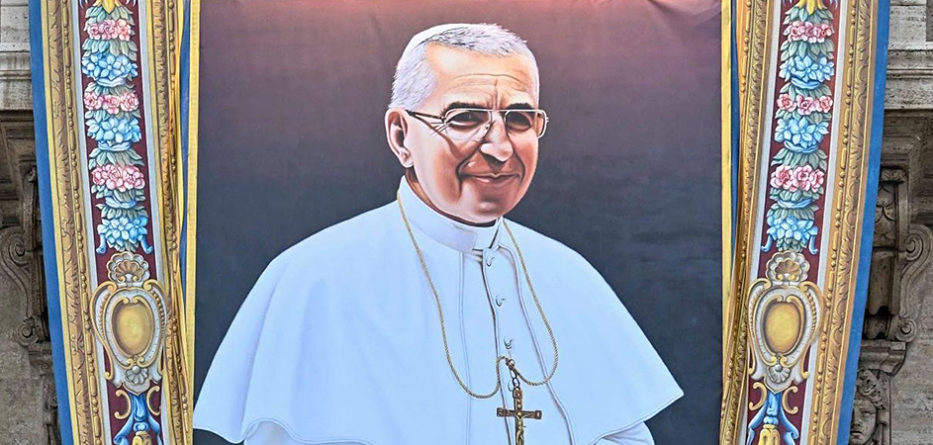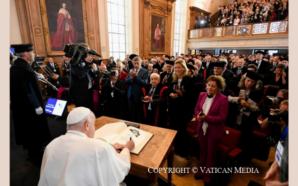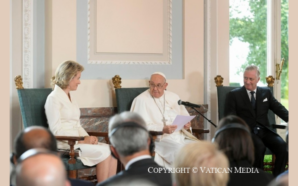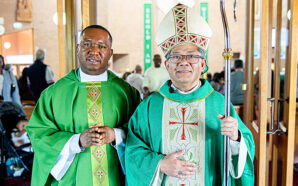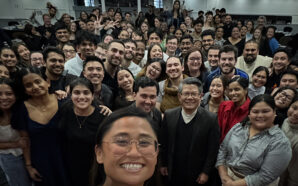Most Illustrious Patriarch,
In the past weeks I have had the opportunity to reread some letters you wrote when you were pastor of souls in your homeland, that Veneto of ancient Catholic tradition, which was being so rapidly transformed in the years of my youth.[1]
I want to congratulate you because one of your scholarly disciples – and devoted admirer! – has dedicated many years of research among the books of your personal library, which had been left a little here and a little there, after various moves, including those papers of yours that you sometimes reread before falling asleep (like that famous 28 September 1978), and the diaries in which you quickly jotted down your notes for the next sermons or upcoming engagements.
Just think a little that after all this work, the generous lady finally took up those imaginary letters that you yourself had wanted to collect, order and publish under the well-chosen title of Illustrissimi, out of respect for the distinguished recipients, and republished them, accompanying them with an incredible number of notes and supplementary information.[2]
I will tell you truthfully that in that long-ago month of September 1978 when you unexpectedly were elected pope, I too had heard about those letters and had looked through some of them, finding them wise and engaging. But then many other things happened, and I thought no more about them. Now I am an old man, and you in the meantime have become “Blessed!”
On May 17, 2024, in the afternoon, in a large hall of the Doge’s Palace in Venice, near St. Mark’s and the Patriarchal Palace where you spent your pastoral ministry for more than eight years, while, beyond the large windows, the sun caressed the marvelous Island of San Giorgio Maggiore, the new edition of Illustrissimi was presented. It was beautiful. There were the Cardinal Secretary of State (also from Veneto and your admirer, as you well know), the current Most Excellent Patriarch, the Superintendent of Archaeology and Fine Arts, the Mayor, Most Excellent Bishops, academic, civil and military dignities, scholars, your affectionate relatives… Many people spoke. The Lectio magistralis – nowadays on great occasions we use this term – was delivered by the Cardinal of Culture, a Portuguese scholar who, given the venue, appropriately took his cue from your letter to the famous Venetian publisher, Aldo Manuzio.[3] Some of his excerpts were well declaimed and there was also no lack of happy musical interludes with harp and voice. In a celebration in Venice, Vivaldi could not be missing. Your scholarly and devoted disciple was rightly showered with praise for the work she has done and for the many things she still proposes to do with a foundation named after you. We wish her well![4]
You probably would not have imagined so much effort and attention to detail around that relatively small book of yours. You tried all your life to express yourself in the simplest and clearest way precisely so that all of us, those more or less learned and intelligent, could understand without any real difficulty what you wanted to tell us: the wisdom of faith and Christian values in daily life, with much humility. But I will tell you that, as far as I am concerned, all this “critical” work has helped me to reflect, not only on what you wrote, but also on what you said and did during your life as priest, bishop and finally pope. Then also to relive it and understand it better.
I have come to appreciate the extraordinary wealth and variety of quotations and references to “classic” and famous authors. Your love of reading since your early youth, when you organized the parish library of Canale d’Agordo, well guided by the excellent Don Filippo Carli and no less by your religious and moral intelligence and sensitivity, enabled you to cultivate the gift of expression at once profound and fine, the taste for simple and popular, yet elevated and elevating conversation. In your letters you turn with ease to Dante and Petrarch, Goldoni and Manzoni, Dickens and Twain, Belli and Trilussa. You quote Gogol and Tolstoy. You talk to the saints most familiar to you, such as Bernard and Bernardino, Teresa of Avila and Therèse of Lisieux, and especially Francis de Sales, a true master of daily holiness and spiritual conversation.
Of this impressive culture, fully integrated into your mission as evangelizer and teacher of faith and morals, scholars and admirers far more experienced than I have spoken much in recent years.[5] For example, they have said very well that “the attention to literature is a kind of more discursive accessus and in the order of the daily word to the themes that are dearest to you, first and foremost poverty and humility.”[6] So there is no need for me to expand on this. Let me add, however, that I was intrigued by the fact that not a few of your letters are enriched by brief stories from Fernando Palazzi’s Encyclopedia of Anecdotes, which you kept in your library: over 15,000 anecdotes, a treasure![7] Mindful of the good advice given to us when we were preparing for the priesthood and making our first efforts to preach, I admire how hard you always tried to give more life to your talks with lively examples and short stories. You spoke and wrote not to exhibit your culture, but to serve your listeners or readers and tried to attract their attention without disdaining these minor oratorical devices.
But, as you know, I am not a scholar, so in rereading your letters, I became rather engrossed in the problems and situations that moved you to write as a pastor. This is also why your learned disciple helped and guided me with careful and brief introductions, explaining precisely when and why and on what topics you felt you had to take up the pen for the sake of your people. Not only that, but I also understood that many parts of your letters include, sometimes even in the same words, homilies and speeches that you had already dedicated to the same urgent topical social or pastoral issue. With Illustrissimi you have thus offered us a kind of small summa of your religious, moral, social and spiritual teachings. One senses that the problems of which you speak touched your heart, because you speak of them in a very orderly and sometimes even almost systematic way, yet your approach was never detached or abstract. One feels the experience, one breathes the life.
* * *
The years that you lived are still quite present to my memory, although today, for many young people, they already seem to belong to prehistory. For one reason or another several of your letters cause my heart to flutter. Even though I have never read Walter Scott’s historical novels or Chesterton’s witty apologetic books, my father – who was a little older than you, had gone to war in your part of the world, on the Asiago Plateau, at 18, and was a good Catholic – had read them as a young man, and I used to hear him quote them. Then, after the Second War he had been a faithful Catholic and a committed Christian Democrat (remember the 1948 elections?) and had always followed and respected authority in the Church without any uncertainty, from the parish priest to the pope. In short, your cultural and ecclesial world is quite familiar to me and was the one in which I had my religious vocation.
Exactly when you were organizing the first Cineforum in Belluno in 1956, one also opened with much enthusiasm in the Jesuit school I attended in Turin, as in so many other centers of good formation. It is pleasant to relive with you your commitment and interest in the Catholic press and publishing, your attention to cinema and the events of the Venice Film Festival. You were not afraid to weigh in on the relationship between art and morality that was much discussed at the time. You even discuss it with Goethe! Today the world of communication has changed a lot. I wonder if you would still write your imaginary letters or if you would be able to find a useful and sensible way to make yourself present in the very busy and rather fragmented and confusing social media conversations! I confess that I have given up on them although I admire those who try their hand at it bravely, sometimes with worthwhile results. But perhaps I have become too lazy, and you would encourage me to try. Certainly your attitude of openness to dialogue and your always respectful language continue to be a shining example against all hate speech, all hatred and violence, so that communication aims to unite and edify, not divide and destroy.
Staying on the subject of communication, I felt very touched by your reflections on the “nostalgia for the clean.” You refer to historical novels that had been very successful in their time and that had “enchanted” you as a boy, such as those of Walter Scott, of which, however, in 1973 you already observed that they were not widely read and are now practically unknown. You note that they were full of extraordinary adventures, set in the Middle Ages or the 17th century, with sieges, ladies and knights, commoners and sorceresses, great love stories; they exalted valor and loyalty and “could confidently be placed into the hands of boys.” This made you exclaim: “Honor to the Scot, the father of the clean, historical novel!” Indeed, while using admirably polite expressions, without being abusive, you regretted with Sir Walter the “present-day deluge of bad press.” Writing to Manzoni, then, you complimented him, writing that “wherever your pen touched, sparks of religious faith sprang forth.” You observed that his Promessi Sposi (The Betrothed) was a novel, a love story, of which Ludovico da Casoria, a holy friar, could say, “It is a book that could be read in a choir of virgins presided over by Our Lady!” Well, already 50 years ago, looking around and reflecting on what could be said or predicted about television, you exclaimed worriedly, “What an enormous problem has befallen parents, educators, pastors of souls and public authorities!” You now have the good fortune to be in the company of Our Lady and the saints of every condition. We here, even though we follow television broadcasts that are considered normal in themselves, find ourselves seeing and hearing scenes and words of a vulgarity that takes one’s breath away, even from those who want to appear witty and would have the qualities to be so. Pope Francis confided to us that this is why he has never watched television for many years; he does not miss much, but of course he remains an exception. Then, today we have to add the Internet, cell phones and so on. If you were talking about a huge problem, imagine what we have to report! Sometimes it feels like drowning in mud. Yet, you know what I tell you? Beautiful and clean love stories are here even today, but it seems harder to see and narrate them. Let us hope that the great longing for the clean will not just make us close our eyes, but open them again to the miracle of love and pure beauty.
Today, in modern society and, of course, in the Church as well, it is impossible not to talk about women. You, too, were already well aware of this and talked about it in your polite and gentle style. I will tell you that, in some respects, our girls today would find it a bit dated. The advice on how to dress, given by Empress Maria Theresa of Austria to her daughter Marie Antoinette, Queen of France (before the guillotine, of course), or even that of St. Francis de Sales to the good ladies of his time about their suitors are certainly wise, but they make me a little uncomfortable. Today giving directions to women, especially coming from a priest, is a sensitive subject, and it is right to be very cautious. I feel I am on firmer ground when you redraw the portrait of the ideal woman drawn 2,500 years ago in the book of Proverbs by King Lemuel and when you evoke Penelope’s faithfulness, even more ancient! Truly profound is the wisdom of returning to Ithaca! It is not an invention of the priests or even the prophets of Israel. It is an unassailable value of human civilization for which we all – women and men – cannot but cultivate respect. Thank you for reminding us of this. On abortion you were also clear in your letter to Goldoni, but today in Europe it is worse than in your time. Many want us to believe that it is a right of freedom without limits. What we considered the basis of our common values is being shaken seriously. There is and will be suffering, as there was for you already. We very much need wise women to speak with courage and authority. We can no longer substitute for them, but we can and must sympathize with them.
* * *
But let’s change the subject, because you help us think about many things, for example, about science. This brought to mind a person whom you knew very well. Just think that your seminary companion, Roberto Busa, who entered the Jesuits (as you also at one time thought of doing) and who remained your friend all his life and collaborated in your move from Venice to Rome, was my professor of philosophy in Gallarate. I remember him well in the chair, straight and solemn, stroking his chin while with a smile of benevolent commiseration he explained to us twenty-somethings that to do metaphysics one must be at least 60 years old, with great experience of the reality of life. What a superior mind! As you well know, he had done his doctorate in philosophy on the “metaphysics of presence” (of God in creatures) by analyzing the use of the preposition in in the works of St. Thomas. He had realized that one could try to use the nascent computers to analyze language… and thus “computational linguistics” was born! Perhaps you felt close to this illustrious friend of yours when you wrote the letter to Guglielmo Marconi on the centenary of his birth, reasoning about the responsibility of science for the true progress of peoples. By the way, a few weeks ago we celebrated the 150th anniversary of Marconi’s birth in the square in front of the first headquarters of Vatican Radio, which he built at the behest of Pius XI on Vatican Hill, and we recalled that beautiful motto of his, “My inventions are to save humanity, not to destroy it!” Today, things have moved far ahead and we are at the same time admiring and frightened by the development of “Artificial Intelligence.” The theme of development in our “common home” has become even more looming than in your time, and your successor Francis seeks to admonish the world’s leaders about their responsibilities, and us about ours, because the situation is very serious.
Certainly, you found yourself governing the diocese of Venice in a time that was not easy, one of strong tensions in society and in the Church. We were in the post-Council period and you were faithfully inspired by the wisdom, balance and patience of Paul VI. How many times you returned to the relationship between authority and freedom. How many times you spoke of revolution and contestation. You spoke of it to the young and the mature, to women and to priests. How much patience and reasonableness you showed as you sought inspiration and spoke of it in your letters with the most diverse characters, from the Barber of Seville to the governor of Milan in I Promessi Sposi (Don Gonzalo Fernández de Córdoba!), even to St. Bonaventure. It almost seems as if you no longer knew which saint to commend yourself to at those junctures. So I was reminded of another dear confrere of mine whom you held in high esteem and invited several times to speak to your clergy, Bartolomeo Sorge. At that time he was at the height of his fame in the Italian Church, after having raised his voice in the Conference “Evangelization and Human Promotion.” He was the editor of our prestigious journal and I had the honor of being his deputy editor. Do you know how many times, coming back from Venice, he spoke about you, with affection and esteem, and the not easy problems you were facing? So many. But he would pass and you would stay. As a matter of fact, then, you had even thought of having him stay in Venice, as your successor, after you had arrived in Rome. I remember those days very well, also because I was in danger of becoming editor of the magazine. But then, toward the end of September, authoritative opinions led you to conclude otherwise. And that was fine.
While I have already told you about two Jesuits, let me also tell you about a third, rather different from the other two, but equally dear. He came to my mind while reading your letters on the sacrament of confession, about which with a stroke of genius you even reason with Petrarch, a pilgrim to Rome for the Jubilee of 1350. You were writing on the eve of the 1975 Jubilee; today here in Rome it is enough to walk the streets to remind us that we are close to the Jubilee of 2025, with one construction site after another! But you remind us that the real meaning would be that of conversion and that we would do well to return to approaching sacramental confession. For this, however, it also takes welcoming and patient priests, eager to give the Lord’s forgiveness and grace. Now, you certainly remember well one of these, Father Leandro Tiveron, faithful custodian of the Church of the Assumption at Fondamenta Nuove, right on the Lagoon in front of the Cemetery Island, and of the adjoining Jesuit house, then admittedly rather dilapidated. The good father, in his long, much-worn black robe, cinched at the waist by the sash, as we used to do, was always available for priestly ministries, tireless and smiling. And he was very humble. Just humble. If I am not mistaken, you had chosen him as your confessor. I am really not surprised. Good choice.
* * *
As you see, Most Illustrious Patriarch, conversing with you one thing leads to another, one memory leads to another. We could go on for a long time talking about your time and ours. Many things have changed a great deal, but there are also many important things that do not pass away and that I am comforted to hear from you again.
You have a great spirit as an educator, like any true pastor. The popes after you are also rightly concerned about how things are going. John Paul II invented World Youth Days; Benedict spoke of the “educational emergency”; Francis insists that we need to rebuild the “pact,” the educational alliance between family, school and society, which has been in crisis for some time. It is clear from your letters that you love young people; you know their feelings and fragilities, and you want to give them wise guidelines, trying to be very, very practical. You talk to us about school with Quintilian; you address adolescents with their first crushes, recalling the adventures of Pinocchio; you give good “rules” to university students for study, quoting Bernardino of Siena; you exhort seminarians to control and improve themselves, evoking the “four temperaments” of Hippocrates; then you move on to talk about the stages of life and finally you entertain us about old age by offering the advice of Alvise Cornaro, “model of a serene old man, a Venetian over ninety years old.” There is something for every stage of our journey, even for us who have reached an even more advanced age than yours, but we welcome your words with gratitude and respect for your gentle wisdom, immensa senectus mentis.
This commitment of yours to daily life sincerely fascinates me. I find your teaching on Christian and human virtues very effective and perennial. We have not forgotten that your four general audiences on Wednesdays in that happy month of September were dedicated, in order, to humility, faith, hope and charity. Rest assured that we noticed that you put humility first, as a solid foundation, to which you gave us a very credible testimony. Of course you had already spoken of these four virtues in your letters and would probably have gone on to tell us about many others. Let me tell you that one of your most substantial pieces seemed to me to be the long dialogue with St. Bernard on prudence in government. It should be carefully reread not only by pastors of the Church, but also by rulers and politicians. They would gain much in moral authority and we would go to the polls more willingly.
It is so pleasant to converse with you that I would like to continue further. But it is time to end our conversation, or else you will be the first to tell me that I have become too long and boring. At the end of the collection, there is a letter – the fortieth – directed to Jesus. It could only be like this. It is very beautiful. It says so much about your love for him, although of course you considered it inadequate. At the end you say to the Lord, “It seems to me that I have omitted the most that could be said about you, that I have said badly what should have been said much better.” To me, the last words of John’s Gospel, the most sublime, immediately came to mind: “But there are also many other things that Jesus did; if every one of them were written down, I suppose that the world itself could not contain the books that would be written” (John 21:25). You wrote one, but as you say well, “The important thing is not that one writes about Christ, but that many love and imitate Christ. And fortunately – despite everything – this is still happening.” Right. However, dear Patriarch, it is a fact that your little book still helps us to love and imitate Jesus. So, thank you from the bottom of my heart!
Reproduced with permission from La Civiltà Cattolica.
[1]. For a concise presentation of the person and work of Pope John Paul I, see our article on the occasion of his beatification: F. Lombardi, John Paul I: The saintliness of a humble bishop, 9 August 2022, https://www.laciviltacattolica.com/john-paul-i-the-saintliness-of-a-humble-bishop/
[2]. Cf. A. Luciani – John Paul I, Illustrissimi. Lettere immaginarie. Critical edition edited by Stefania Falasca, Padua, Messaggero – Fondazione Vaticana Giovanni Paolo I, 2023. This edition is based on her doctoral thesis: S. Falasca, Sermo humilis e referenze letterarie negli scritti di papa Luciani: il caso di Illustrissimi, University of Rome Tor Vergata, 2011-2012. The first edition of Illustrissimi. Lettere del Patriarca had been published by Edizioni Messaggero of Padua in 1976; the fourth is dated October 1978 and John Paul I himself had wanted to revise it and send the publisher some revisions shortly before his death.
[3]. Cardinal José Tolentino de Mendonça, prefect of the Dicastery for Culture and Education, also wrote the Preface of the new edition of Illustrissimi.
[4]. Prior to the ceremony at the Doge’s Palace, on the same day, at the Patriarchal Library, adjacent to the Seminary and the Basilica della Salute, the inauguration of a Hall dedicated to John Paul I took place. It houses the rediscovered volumes of the library collection that belonged to Luciani. The John Paul I Vatican Foundation has been very committed to the recovery and reconstruction of Pope Luciani’s library and archive, on the basis of which it now promotes a rich program of research and cultural initiatives.
[5]. In addition to Falasca’s contributions, we can recall, for example, C. Ossola “La riconciliazione reinstaurata: il Magistero di Giovanni Paolo I”, in S. Falasca – F. Tudini (eds), Il Magistero di Giovanni Paolo I. Uno studio storico e teologico attraverso le carte d’archivio, Rome, Viella, 2023; S. Martuscelli, Soave e piano. Il discorso letterario nel magistero di Albino Luciani, Venice, Marcianum, 2023.
[6]. C. Ossola, “La riconciliazione reinstaurata”… op. cit., 27.
[7]. Cf. F. Palazzi, Enciclopedia degli aneddoti. 15.653 aneddoti storici di tutti i tempi e paesi. Raccolti e ordinati, 3 voll., Milan, Ceschina, 1966.




